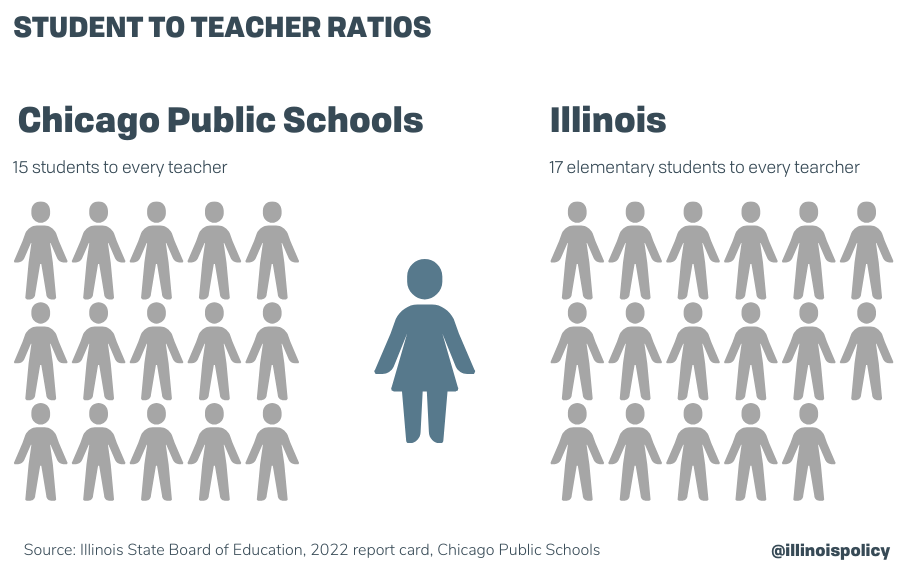Vallas: Prepare for next Chicago Teachers Union contract to hurt
As negotiations begin on a new Chicago Teachers Union contract, expect them to push for higher pay, less work, less accountability and less competition. None of those things will lead to better educations for Chicago’s children.
With the Chicago Teachers Union contract expiring next summer, the negotiations are beginning and the CTU is preparing to give Chicagoans a rough ride.
The last contract cost Chicago Public Schools a record $1.5 billion and made CPS teachers among the highest-paid of the nation’s big districts – while not adding any instructional time. The monster deal didn’t prevent the union from engaging in two work stoppages since the contract went into effect, forcing CPS to close its campuses for a combined 78 weeks with devastating consequences. They also went full steam at limiting public school choice by capping the number of public charter schools and their enrollment as well as pushing for the state’s only school choice program to die.
CTU President Stacy Davis Gates used old rhetoric as the justification for “some pretty strong demands” in negotiations, claiming inequity and injustice that Black and Brown students and their families experience in Chicago. Davis Gates said she has started “talking turkey” with her members about their priorities for any new deal. They include smaller class sizes, more bilingual support staff to serve the children of asylum seekers, building time into the elementary school day for teachers to collaborate and more “sustainable community schools.”
Translated: more union staff, less instructional time and (of course) higher salaries.
CPS’ full-time positions already grew 18.7% during the past three years. CPS now has 45,159 full-time positions, despite losing 11% of its enrollment since 2019. The district has one full-time employee for every seven students and one budgeted teaching position for every 15.

The CTU wants to return to the soft bigotry of low expectations by abandoning standards and accountability for students, schools and teachers while demanding even more funding and eliminating all competition, including public charter schools.
Davis Gates is right. There is inequity and injustice in our society and schools. But it’s because of our antiquated teachers union-dominated public school system.
Institutional racism both festers and flourishes in the absence of high standards and accountability, and in the absence of school choice. It festers when communities – particularly in poor, large urban school districts – are denied quality schools and are blocked by the CTU from securing fundamental changes in their often-failing local schools.
It flourishes because teachers unions such as CTU spend fortunes to preserve their destructive monopoly on America’s public education institutions. These monopolies – like all monopolies unfettered by competition – too often doom children to “educational redlining.” In other words, poor families are subjected to whatever quality the public school in their ZIP code provides. When the quality is bad, they are stuck with subpar neighborhood schools. The failing schools in Davis Gates’ own neighborhood – bad enough she chose a private school for her own child – is the fault of CTU. CTU has blocked any changes that would improve those schools, if those changes in any way impact members’ job assignments, workloads or job security.
Instead of throwing more money at CTU, here’s how CPS can address the inequity and injustice that’s been a direct product of CTU’s domination:
Decentralizing the school district so the money truly follows the children
Facing what the district claims to be a $628 million deficit when the COVID money runs out, it’s time to radically decentralize the school district and provide autonomy to local principals and their elected Local School Councils. This includes going to a school-based budgeting model in which the money truly follows the students. In a district that spends $30,000 per student, it is unconscionable that only 57% of the district’s money finds its way to the local schools for instruction. Local schools need full autonomy to determine the most appropriate staffing model and the length of the school day and school year.
Embracing high academic standards and accountability
The district must restore and embrace high academic standards and accountability for students, schools and teachers. Last year, just 11% of Black students in grades 3-8 tested at grade level in reading and 6% in math; while only 10% of Black students met the national SAT reading proficiency standard, and only 7.9% met proficiency in math. Yet the district graduated 83% of the students. No failing schools have been reconstituted despite a number having no children reading at grade level and 100% of the teachers passing their evaluations.
Opening the schools to the community
The CTU hypes their community school model without ever explaining it. Chicago has 20 community schools today. Why aren’t all its over 600 schools community schools? These schools would invite outside groups to expand learning opportunities, provide health and social service supports, and offer opportunities for family and community engagement. Schools could open campuses in the early morning, keep them open through the afternoon, evenings, weekends, holidays and the summer. They could extend the instructional day and year to make up for lost instructional time during COVID-19.
Empowering the community to shape their local schools
There is a lot of lip service about empowering the elected Local School Councils and the community, but real local empowerment means giving the councils and their school principals control over anything from the budget and the staffing model to selecting a better school model or even converting their school to a public charter school.
Removing the obstacles to expanding public school choice
Public charter schools and Invest in Kids have provided the only school alternatives for most low-income families. The district’s 114 public charter schools serve 54,000 students: one-tenth of all elementary and one-fourth of all high school students, more than 98% of whom are students of color. Yet under CTU pressure, the district denies them equity in funding and in the use of empty public school buildings while their numbers and enrollment are capped. Charters need to be treated equitably and the caps on their number and enrollment lifted.
Incorporating work-study into the high school experience
CPS must better introduce students to the work world and offer meaningful pathways to jobs. They could do this by inviting and financing vocational education and work-study programs operated by city labor unions, city departments, agencies and city contractors. Other private-sector employers can also be incentivized to participate. Paid work-study options can be financed by offering them as alternatives to many of the electives and non-essential courses currently being offered by schools.
Supporting private school scholarships
Working families and the poor are entitled to the same school choices as the Davis Gates family, as the family of the chief lobbyist for the Illinois Federation of Teachers and as 40% of CPS teachers who send their kids to private schools. The poor and working families deserve access to private schools of their choosing that the Invest in Kids scholarship program provides. The average household income of families whose children are scholarship recipients is $45,000. The scholarship takes no money away from public schools and costs the state less than 0.5% of what it provides the K-12 public schools.
Taking action on these issues is how CTU and Davis Gates truly address inequality and injustice. But the CTU will stand against it, opposing any measure that impacts their members, increases their workload or strengthens accountability. They will oppose any program that diminishes their ranks or outsources their work, even to other unions who have the expertise. Their agenda is more pay, less work, less accountability and no competition.
Chicago’s children lose in that equation.
